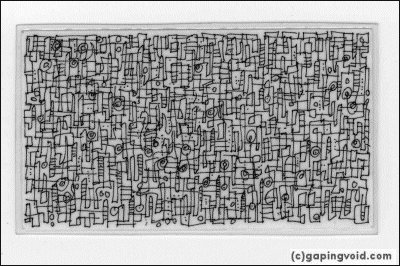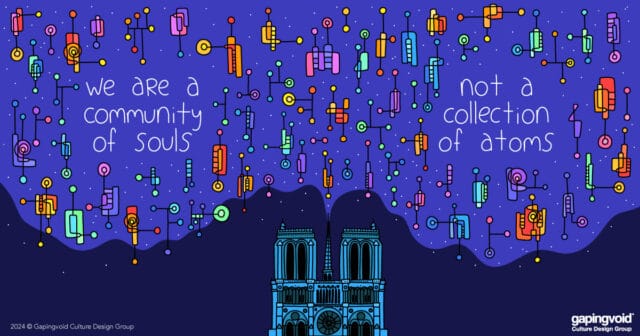
[One of my favorite early ones. Laminated. February 1998, NYNY. Funny, it was drawn on the back of this business card a certain girl gave me. She and I never saw each other again after that evening, in spite of what transpired in the back of the taxi.]
In the comments of my recent blog post, “Thoughts On Being An Artist”, John T. Unger said something that really struck me:
The thing about working as an artist is that you never realize how much of the work is on top of making the actual art. I was remembering how when I started out, I would visit the studios of more established artists and couldn’t begin to grasp how they ran the show. It’s taken years to slowly put each piece in place. Every day there’s new problems to solve, but if you can solve them in a way that sticks— so that from now on that issue is covered, eventually you come up with an efficient system for supporting the most important work you do, which is the art.
I guess this is pretty much true with all businesses, no? It’s not the thing you make and sell that is the problem, it’s the thousands of other things that spring up around it…
I’m starting to think that writing about a lot of issues that artists have to deal with, would be interesting to a lot of other people, besides just other artists.
Artists- successful ones, anyway- have to create stuff out of thin air, then somehow find a way to sell it at a profit.
The Art Purists will be horrified to hear this, but yeah, you really do need the mind of entrepreneur and a marketer to be able to do that.
“Artists cannot market” is complete crap. Warhol was GREAT at marketing. As was Picasso and countless other “Blue Chips”. Of course, they’d often take the “anti-marketing” stance as a form of marketing themselves. And their patrons lapped it up.
The way artists market themselves is by having a great story, by having a “Myth”. Telling anecdotal stories about Warhol, Pollack, Basquiat, Van Gogh is both (A) fun and (B) has a mythical dimension… if they didn’t, they wouldn’t have had movies made about them. The art feeds the myth. The myth feeds the art.
[Backstory: About Hugh. E-mail Hugh. Twitter. Newsletter. Book.. Interview One. Interview Two. EVIL PLANS. Limited Edition Prints. Private Commissions. Cube Grenades.]




Great stuff, as always. I consider the filmmaking itself to be the easy part, and the fact that right now I’m fundraising to do it the struggle that I face. And in the case of my other films, attempting to convince the money types that the film, and by extension me, is a good investment.
Sadly, artists often discount the necessity of a business plan. Only in rare instances will art sell itself.
In the beginning was the myth…
When I first set out to be an artist, my goal was to be a writer. I have no talent for fiction, so I figured my best bet was to live an interesting life and then write it down. Basically, I left home and set out to become a folk hero. My heroes were heroes and I couldn’t see any real reason I couldn’t find my own way to make that leap myself.
Creating a compelling story around my adventures without straying from the truth has sometimes been terrifying, sometimes awesome, sometimes inconvenient… But at all times it’s been exciting at least for me. Which is how I think life should be lived, no matter what your goals are. I’m lucky enough that the story has become a part of how I make my living (and vice versa) but the adventure itself is worth every disaster I’ve weathered along the way.
Definitely right that the experience of marketing yourself and basically setting up business as an artist can provide some very relevant insights and ideas that are transferable to many other domains of business. Looking forward to hear more.
The idea of the artist as a genius mythical figure and marketing oneself through that sort of myth creation is a little tired, though. But still popular, not least in the traditionalist art buyer market.
– Some people have a lot less trouble with the idea of the artist as a myth and genius creator than as an entrepreneur interacting in the real world.
Thanks, Hugh.
For many, putting some effort into marketing their work (art, book, blog – whatever) just looks too much like hard work.
It’s a fight against laziness as they sit there aggressively waiting for the phone to ring.
Much easier to kvetch and blame.
Best, Robin
I just put up the Zappa quote on Twitter about artists making something out nothing and selling it. All the niggling details and support framework of being an artist is probably the enigma to most creative people. The idea is there, but the whirlwind surrounding it is a mystery.
I think people’d benefit from anyone’s experience in and during the setup of this framework. Especially someone like you who’s done it by the seat of your pants in a unique way and environment.
Peace.
So true. The easiest part of my business is making the jewellery, it’s finding the customers, sourcing materials, packaging items so they don’t break, dealing with the post office when things go wrong, being caring and helpful in customer service without spending hours on something that doesn’t make you much money, trying to sort your accounts when you have no idea etc that is the hard bit!
Do you find that as the entrepreneurial and marketing tasks grow the creativity shrinks?
I have always been curious to hear how an artists creativity is effected by all the other busywork they have to perform as their business grows.
“Do you find that as the entrepreneurial and marketing tasks grow the creativity shrinks?”
For some, yes. But not for all. Picasso thrived when he was busy & successful.
Every time I sell a painting, my creativity soars… because I gain confidence in my ideas.
So, putting ample time into marketing in order to sell a painting indirectly feeds my creativity.
Business is a crazy type of performance art that needs to get the message out to the right people. If not, it is considered unsuccessful.
Ironically, when artists aren’t able to get their message out, that somehow earns them street cred.
Artists and creators of all types need to learn how to send the right message to the right people or suffer the consequences. Otherwise, what are they? – selfish, dense, lazy? Hard words, but where’s the truth?
-former music comp major, business owner
Glad to have stumbled upon your blog – I love it. Found you through Amazon…
;-),
A.
Thanks, A., I hope you keep coming back 🙂
When I’m focusing on creating, I need to keep my business head in the back round. Sometimes I get a creative idea when I’m in entrepreneur mode.
I think our generation can do both.
I’m much better at marketing other people’s stuff tho.
[…] is the cartoonist Hugh MacLeod in his blog gapingvoid. This week he wrote a post titled: “artists are entrepreneurs and marketers, too“. The subject of the connection between art and business is a subject he writes a lot about […]
Reminds me of Thomas Edison, who basically created the myth of the “tireless inventor”.
Marketing and being an entrepreneur are age old realities of the serious and successful artist. Albrecht Durer http://en.wikipedia.org/wiki/Albrecht_Durer invented etching so he could sell more images to more people. What I find the most difficult is keeping the filter clear so what comes through isn’t polluted. What gets made and focused on is what matters. Time spent cultivating relationships is time well spent. Cultivating the right relationships takes a bit of cunning, a bit of cold (icicle in the heart) because the editor is always present. A successful artist needs cold and heat (passion) to keep it going. Selling work? Child’s play. Staying focused and clear? The work of a master.
Well, off course, I’m not a drawing/painting artist, but I always tell people who are considering working as freelancers (designers, graphic artists, editorial types, writers, and production people) that easily 50% of the work of a freelancer is finding that next job.
It’s a neverending cycle: get the job, do the job, get the next job …
Thanks for the post.
Yes, many artists can be both creative and an entrepeneur. Why is it so hard to comprehend that artists with such creativity cannot be equally creative in the business duties? They can and many are. There are some who aren’t, but is it really that they don’t comprehend business or that they don’t take the effort?
Interestingly, an economics professor in college once made a comment which has facinated me after all these years. Both artists and entrepeneurs share many attributes. We are the same breed.
I am both.
I have 3 websites, I have hoped that I can sell some of my paintings through my sites, to tell the truth I have not imagined that money will keep flowing in , I just hoped to sell one or two of my paintings, but I have given an impression to some people that I am an ambitious person and that I have intended to get rich by my websites, why do I have such an impression? Because I have recieved very malicious remarks about my websites, a guy has said to me ‘you won’t get anything by your websites, you only scare people’ Can somebody explain to me why do people have such reactions about my sites?
these people are called “haters”…angered and frustrated by their own lack of success, or lacking the courage and ambition to work for it, they take refuge in denigrating those who do have the ambition and courage…
i see so many artists who have painted themselves into a corner, telling themselves that to be financially successful as an artist you have to sell out…funny…that doesn’t seem to be true of other types of art…musicians can get record deals, actors can get major roles…why shouldn’t painters get to be successful too? for me, i am done with that myth…i think we have to take responsibility for our own success in our careers…sitting around waiting to be discovered will insure our status as struggling, starving artists…we need to embrace success as part of the full expression of our work…success is what allows us to devote all of our time to our art.
As a choreographer, everyone’s comments resonate well. Performing folks have similar time crunch issues with make the work, present the work, market the work, raise the money to do all of the above. Portable online tools do help. Glad to see we’re all thinking about doing this ourselves rather than waiting for someone to do it for us.
thanks for listening,
Toni